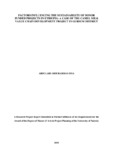| dc.contributor.author | Issa, Abdulahi Abdurahman | |
| dc.date.accessioned | 2018-10-25T07:04:46Z | |
| dc.date.available | 2018-10-25T07:04:46Z | |
| dc.date.issued | 2018 | |
| dc.identifier.uri | http://hdl.handle.net/11295/104394 | |
| dc.description | Master of Arts in Project Planning | en_US |
| dc.description.abstract | The purpose of the study was to investigate the factors influencing the sustainability of donor funded projects in Ethiopia with reference to USAID funded projects and implemented by ACPA camel milk value chain development project in Gursum district of Ethiopia. This study was guided by the following objectives: To determine the extent at which the level of community participation influences sustainability of donor funded Camel Milk Value-Chain Development Project in Gursum district, To establish the extent at which project leadership influences sustainability of donor funded Camel Milk Value-Chain Development Project in Gursum district, To determine the extent at which community capacity influence the sustainability of donor funded Camel Milk Value-Chain Development Project in Gursum district and to determine the influence of practicing M&E during the project cycle on sustainability of donor funded camel milk Value-chain development project in Gursum district. The study used a descriptive survey research design and mixed method approach. The targeted population are all beneficiary of 200 households where a sample of 127 households targeted through stratified random sampling. Questionnaires and structured interview guides were used for data collection. Descriptive analysis used to analyze the data using SPSS software. The findings are presented using descriptive statistics. Frequencies, percentages, mean and standard deviation to explain the responses to the questionnaires. We concluded from the study that community development projects have positively transformed the lives of the local community, facilitated participation of local communities in development initiatives in the region, encouraged residents to take ownerships of their own community resources, improved food security in the region, encouraged residents to conserve available natural resources, as well as helped the community gained substantial knowledge and technical skills from the project. The following recommendations were made from the study; - The project management should seek to adopt modern technology through increased budgetary allocations, the government should institute stringent measures to deal with persons vandalizing the community project. This should be coupled with improved security offered by the security agencies to mitigate the cases of vandalism. The community development projects should also be managed by highly competent personnel to increase its efficiency and sustainability. The level of player’s participation in the project planning and implementation should be increased to enhance the sustainability of the community development projects in the county. | en_US |
| dc.language.iso | en | en_US |
| dc.publisher | University of Nairobi | en_US |
| dc.rights | Attribution-NonCommercial-NoDerivs 3.0 United States | * |
| dc.rights.uri | http://creativecommons.org/licenses/by-nc-nd/3.0/us/ | * |
| dc.subject | Camel milk | en_US |
| dc.subject | Value chain development | en_US |
| dc.title | Factors Influencing the Sustainability of Donor Funded Projects in Ethiopia: a Case of the Camel Milk Value Chain Development Project in Gursum District | en_US |
| dc.type | Thesis | en_US |



